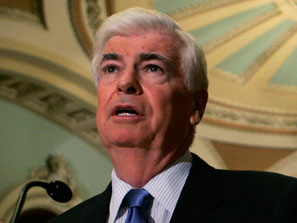
Senator Johnny Isakson
In a statement delivered on the Senate floor on Tuesday, October 13, 2009, United States Senator Johnny Isakson (R-Georgia) elaborated on his proposal, jointly sponsored with Senator Chris Dodd (D-Connecticut), to extend and expand the soon-to-expire Home Buyer Tax Credit. See full remarks: http://isakson.senate.gov/floor/2009/101309hbtc.htm
The Senator proposes extending the tax credit through June 30, 2010, eliminating the first-time buyer restriction, and increasing the income limits to $150,000 for an individual and $300,000 for a family, all before the current law expires on November 30, 2009.
He specifically addresses his concerns on the impact of housing demand on foreclosures: “Houses continue to decline in their value because the market demand is down. The foreclosures we see today are not subprime loans; they were the loans that were foreclosed on a year or a year and a half ago. When we read the addresses of these 1,157, which I won’t do, they are the addresses of mainstream America and the mortgages that are being foreclosed on are what are called conventional loans that were made to people who had jobs, had income sufficient to make the payments, and had downpayments of 5, 10, or 20 percent.”
He linked housing demand and the foreclosure rate: “The first-time home buyer tax credit is about to expire. What does that have to do with this foreclosure problem we have and the problem of declining values of houses and shrinking equities for the American people? It has everything to do with it. We have a great demonstration project in the first-time home buyer tax credit that shows this Congress the way to continue and get a recovery in our housing market. In the time the first-time home buyer tax credit has been in effect, it is estimated that 350,000 home sales were made. That is 357,000 sales that would not have taken place.”
And he specifically addressed the termination date of the current law: “So I would submit that when we look at the sunset date of November 30 on the first-time home buyer tax credit, we should extend it–not forever but through midyear next year, to the end of June 2010. There is a reason for that recommendation. The worst 3 months of the year in any housing market anywhere in the United States are December, January, and February because it is winter and because it is the holidays. So there is not much of a market to begin with in those 3 months. If this tax credit dies in November and then it dies the day before the declining market takes place, by the time the spring market comes back in March and April, it is too late and we will have a protracted period of even poorer sales than we have had recently. But if we pass and extend the credit through June 30 of next year, we continue to buoy the housing market around the country.”
He continued, tying the current recession to the collapse of the housing market: “It is very important that we stimulate and continue the existing stimulation of the housing market. The recession that began in December of 2007 began with a collapse of housing, first because of the subprime mortgage failures, but it continues to today, a continuing collapse, and the failures aren’t subprime, high-risk credits, they are mainstream America. There is a point in time when we owe it to our country, we owe it to our economy, we owe it to mainstream America, where we know we have a proven program that works, to extend it and buoy the marketplace.”
He ended his statement with a plea: “So I come to the floor today to ask everybody in the Senate to think about what is happening. Six weeks from now, the tax credit sunsets. When it fails, the market again will have downward depression on values, on sales, and most importantly on consumer confidence. Let’s try to slow down the rate of foreclosure. Let’s help Middle America, which right now faces difficult times. Let’s take them out of the newspaper and let’s take them back into a buoyant economy that has jobs, has growth, and has promise for the future.”
In summary, he added: “I submit that an extension of the first-time home buyer credit by removing the means test, raising the income limitation, and extending it to midyear is good for America, makes good sense for this Senate, and I hope we will find the time before the current bill sunsets to pass it and do it for America.”
We agree almost completely with the Senator, except for one, tiny but important flaw. The only criticism we would have is that the law should be extended for one year, to November 30th, 2010, instead of just to June 30th.

Senator Chris Dodd
The reason for this is that otherwise, the new law would only apply to existing homes and standing builder spec home inventory.
Anyone wanting to build a new home under the plan would be excluded because in most parts of the country, except for the
smallest homes, it typically takes 8-to-9 months from the date of signing a purchase agreement to complete the new home.
It doesn’t make sense to exclude this important sector of buyers, many of whom would participate in the move-up, custom home sector.
 The U. S. Census Bureau announced today that sales of new one-family homes fell by 3.6% in September 2009 over the previous month to 402,000 units. Units sales in July were revised down to 417,000 from 429,000 units as originally reported.
The U. S. Census Bureau announced today that sales of new one-family homes fell by 3.6% in September 2009 over the previous month to 402,000 units. Units sales in July were revised down to 417,000 from 429,000 units as originally reported.



